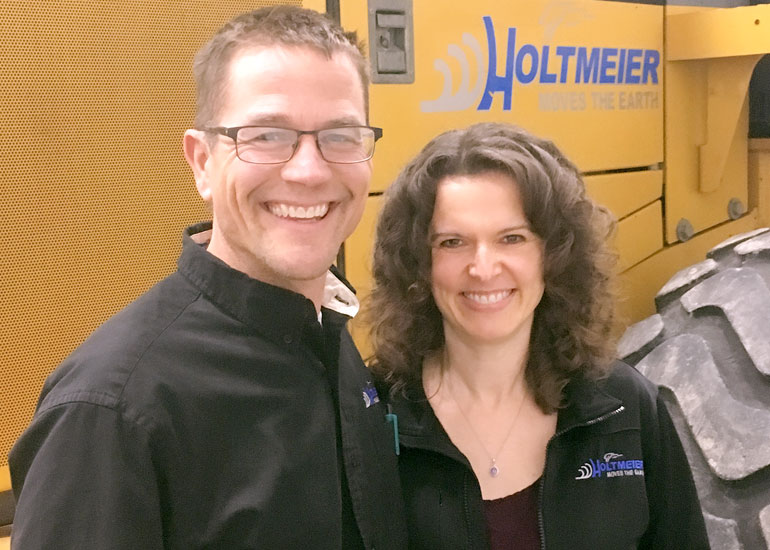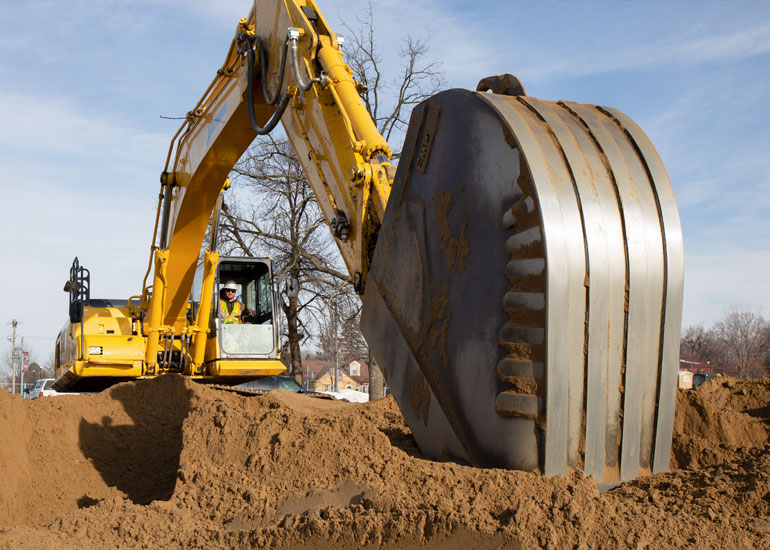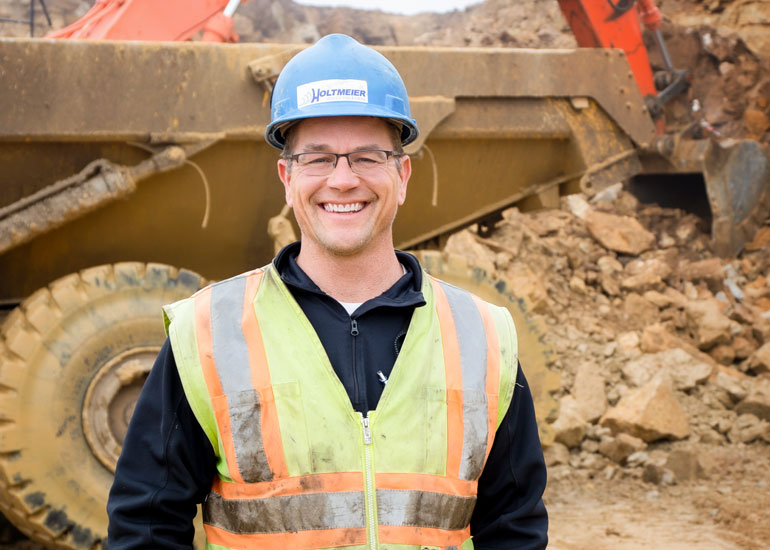ROCK SOLID
Built on a Strong Foundation
When Joe and Bethany Holtmeier opened Holtmeier Construction Inc. in 1998, it was a simple operation: just Joe and a backhoe. They were a young couple, just starting a family.
Bethany managed the company accounts with her 9-month-old daughter balanced on her hip while Joe competed for contracts and installed underground utilities.
Twenty-four years later, Holtmeier Construction has 100 employees and over 300 pieces of equipment. Its main facility is located in Mankato, where it owns several sand and gravel pits and operates a limestone quarry.

Joe and Bethany Holtmeier (Submitted photo)
“We have the biggest equipment, the most capability and the horsepower to do the largest underground construction projects in southern Minnesota,” Joe Holtmeier said.
The Holtmeiers have recruited new talent into their leadership team, asking employees Jim Voda and Matt Schneider to join them as co-owners in 2020. They’ve also expanded their reach, partnering in the formation of two related companies, Dirt Merchant and Pentagon Materials.
“Holtmeier Construction’s primary focus is quarrying activities, crushing activities, street reconstruction and utility work. Dirt Merchant focuses on private commercial grading work, but they also do utility work, too. Pentagon Materials produces aggregate,” Joe Holtmeier said.
A quick tour of their offices reveals a gallery of photos highlighting important moments in company history. There’s an image of their first day in business with Joe Holtmeier and his daughter beaming at the camera from the seat of a backhoe. In another picture, a young boy wearing a toy tool belt and hard hat visits the Holtmeier Construction site at Fallenstein Park. A third photo shows an employee’s pajama-clad toddler staring out a window, clearly fascinated with the backhoe parked in his backyard.
“These are all pictures of our workers’ children. That’s (the son of) Joe’s right-hand-man looking at the backhoe. Our boys were the same way. They loved the equipment. Even our daughter. This business is so entrenched in her life that ‘backhoe’ was one of her first words,” Bethany Holtmeier said.
It’s a Saturday in December, so the Holtmeier offices are empty. The sound of the Holtmeiers’ youngest son working on a project in the shop can occasionally be heard. As we walk by each desk, the Holtmeiers stop to praise each employee and tell me the many ways they contribute to the company’s success.
Although they are experts at moving rock and soil with heavy equipment, it’s clear people are at the heart of this business.
Tell me about your background. Are you both from Mankato?
Joe Holtmeier: Bethany and I met in college at Minnesota State University, Mankato.
Bethany Holtmeier: Joe is from Waconia, Minnesota, and he came here for the construction management program at MSU. I’m from Colorado, and I came to MSU for aviation. Those are two specialty fields at MSU that you can’t find in a lot of schools. Eventually I moved into elementary teaching.
JH: On our first date I found out we had something in common.
BH: Both of our paternal grandparents had trucking companies; his were in Nebraska and mine were in Hutchinson. It’s kind of an odd coincidence.
JH: That was really fun. I’ve always loved trucks — I drew pictures of trucks at recess — and here’s this young lady who’s so cute and wonderful and she’s affiliated with trucking. Wow!
You didn’t stand a chance.
JH: I didn’t.
I was head over heels. Shortly before I graduated, I went to Papua New Guinea and built a water supply line for a hospital. It was part of my internship for construction management. And at the time, Bethany and I weren’t married yet. It was a real interesting experience, and I wanted to share it with her. So I said, “Why don’t you come over and see what it’s about?” Bethany says I was just homesick and lonely, but I say I knew she was the woman of my dreams.
I like your version better, Joe.
JH: It sounds like better script material than I was just this lonely, sappy guy. Anyway, Bethany was going to school for education, but she put her life on pause to help me with my life. She came over and taught at the missionary school that was there.
BH: It was just for three months, but it was so much fun. I loved it, and it just reinforced that this is what I want to do. I want to teach.
JH: It was an opportunity to serve others with gifts we had been given in a meaningful way. Then we came back and got married. Bethany still had some college to finish up at MSU, and I continued working for Machtemes Construction in the metro area. That was my first taste of construction. If Chuck Machtemes wasn’t such a good boss, I don’t know if I’d be where I am today. Chuck was the type of guy who gave you opportunities, but he kept the opportunities … things that you could succeed at. He didn’t tell you to do something that you were incapable of, so you could have some success. Also, if you did something wrong, he would get after you in a way that wasn’t derogatory and point out your error. So that was encouraging. I was just putting my toe in the water in construction and having a good mentor made a difference.
Eventually I wanted a local job where I could be in a foreman-type position. So I applied at local contractors that did utility construction, and I was hired by C. W. Scheurer & Sons Construction here in Mankato.
What made you decide to branch off and start your own business?
BH: It was kind of just by trial and error. I was a teacher, then we had our first child and I was going to stay home with her. At that time, Joe worked for a different company, and he would get laid off in the winters. So we went to Colorado, where my parents live, and Joe went to work for a contractor in Colorado for a few months to make some money while we were there. It was always his dream to try starting our own company. So we thought, when we get back to Minnesota let’s try it.
JH: I, as you might have guessed, was more excited about this idea than maybe she was. She must have been thinking, “What kind of crazy path are you taking me on?” Bethany stood behind the idea and had the confidence that we could do it — and we did.
BH: We had no money, so we couldn’t afford to hire accountants. My dad was an accountant, so I had a lot of phone calls with him. He taught me what I needed to do. I’d have my daughter on one hip (while) working on the computer.
JH: That’s an important part of the support you need to run a business. Lots of people have this idea that they want to run a business: I want to do it because I know how to fix cars, or I know how to pound boards together, or I know how to run an excavator. But if you don’t have that business component, the accounting side, it doesn’t work.
When we started the business, I wanted to do projects where I could handle the risk. Underground construction is risky by nature. But some projects are more risky than others. One of my goals was to work for people who were going to pay you. New development work might be easier to build and more profitable, but if you’re working for a developer and the developer goes broke, you’re toast. So, I wanted to work for municipalities where once you get the work done, you get paid.
We were also strategic (about) selecting projects. As a subcontractor, I chose to work with general contractors that had a good reputation and projects that were fairly simple in scope, because even though the return is a little bit smaller, the rate of success is higher. What I needed to do was start a string of success. Failure wasn’t an option for the first few years because we didn’t have enough equity to sustain failure. So we had to be careful with project selection.
BH: It took a lot of work. Joe was calling and calling and so many doors slammed in our faces.
JH: And rightly so, because the construction projects that we do are not small-dollar items. It’s big money, and you can’t put your faith in someone who hasn’t proven themselves. When we were first starting out, we hadn’t proven much.
We started out taking smaller projects as a subcontractor, because I wanted to be responsible for our own problems. I didn’t want to have to worry if the concrete guy failed or the paving guy failed or the seeder failed. I just wanted to focus on what we were doing and make sure we did a good job. We did that for the first couple of years. Then we started being the general contractor on street reconstruction projects. When you’re the general contractor, you set the schedule and then you can control your schedule throughout the year with your workforces, putting your guys where you want them at the time you want them there. So that helped with profitability. Then we just kept adding crews and it grew from there.
What services do you provide today?
JH: I would say maybe 60 percent of our revenue is generated from public contracts for underground utility work, sewer, water and street reconstructions. Twenty percent is from aggregates, and 20 percent is private and commercial work.
Where are your customers located?
JH: Our goal is to work within a 60-mile radius of Mankato because that gets our guys home every night. That’s important. Some companies do quite a bit of traveling. They specifically chase this type of project because that’s where their margins are the best. Bethany and I both feel the best thing for workers is to be home every night so they can be with their family. So we have grown our company by grabbing the work that has anything to do with heavy equipment that’s in that 60-mile radius. We’ve expanded that way instead of geographically.
Did the desire to stay close to home drive your diversification into supporting industries?
JH: Yes, it did. Let’s just say there’s $100 million of our type of work in the 60-mile radius from Mankato — then you have to do more of the services that are tied to that work. A big piece of what helped us grow was we started a quarry just north of the office here. We bought a piece of ground that had limestone on it, and we started crushing limestone and using that material in our own projects. That led us into the crushing business. The crusher wasn’t busy all year with making our own products, so we were able to take that crushing crew and start doing crushing projects for other people. We were also able to buy some other pieces of ground around Mankato that had sand and gravel products in them and start sand and gravel pits. So then we had three locations.
Another big step was getting into recycled crushing. When we do a project on a street reconstruction, we come in and we remove all the blacktop, curb and sidewalk. With recycled crushing, instead of hauling it away to a dump and then hauling new materials in, we just find a spot to put our crusher and we recycle the old materials and reuse it for the road base.
So that was a big step because it gave us a competitive advantage. One of our T-shirts has a picture of our crusher and reads, “Southern Minnesota’s Largest Recycler.” We recycled over 300,000 tons of concrete and asphalt last year. No one else does that much in southern Minnesota.
In 2003 Dirt Merchant was started. As a prime contractor on a project, one of the portions that we would sub out is mass earth moving. We were hiring grading subcontractors, and they were causing delays on our projects. They just weren’t doing a very good job. So we thought, why don’t we just do this ourselves? This gave us the opportunity to be part of a business that supported what we were doing at Holtmeier. Dirt Merchant quickly became very proficient at earth moving and site work, becoming one of Holtmeier’s best aggregate customers. We have been able to learn a lot from each other. Kevin Depuydt is now the majority owner of Dirt Merchant.
Then in 2018, we joined with Kevin Depuydt, Jim Voda and Marty Preusser to form Pentagon Materials. It’s an aggregate producer, and we have one pit in Prior Lake, Minnesota, and two pits in Belle Plaine, Minnesota.
Holtmeier Construction has about 100 employees, Dirt Merchant has about 50 and Pentagon Materials probably has around 25.
There’s a twinkle in your eye when you talk about your work. That’s rare.
JH: When I leave in the morning, I’m excited about what happened yesterday and I can’t wait to engage in what’s going to happen today. I’m so excited and I have a lot of people that are like that because they call me in the morning to talk about our projects. Enthusiasm spreads, it trickles down.
How do you create that level of participation and engagement in your team?
JH: It takes a long time to grow that culture. It’s not just, “Oh, guys, I read this book last night and it said this is what we should do, and why don’t you go do it.” It starts at the beginning as we’re grooming these people.
I share our company goals with our employees. I want them to think big picture, and I want them to be involved in bringing good ideas and anticipating problems. It’s all part of teamwork. The first thing I want our employees to know is that we need you. We need you engaged. We need you to bring your mind to the game. We need you to bring your experience to the game. Everybody on a project sees things from a different perspective, and we need input from everybody to make it happen.
When people come to you with ideas in your organization, your first job is to encourage them. You’ve got to encourage them in their idea and help them think it through. It might be, “Hey, good idea. Let’s do it.” Or it might be, “Hey, that’s a good idea, but what about X, Y and Z?” If you do that, you’re encouraging the guys to be part of the team and engaging their brains. When you get their brains involved in what you’re doing, you prevent boredom and burnout.
Being a team player is so important. We try to instill in these guys that wherever you’re plugged in on the team, when it’s your time to go, you go. You do your tasks so the next guy can do his tasks. Everybody’s job is important and we’re all counting on you to be dependable. The neat thing about construction is that at the end of the day, you can look back and see what you got done. It’s tangible. You get a sense of accomplishment that’s reinforced on an hourly and on a daily level. If you have people who know that they’re appreciated for who they are and what they can do, your team is unstoppable. You’re going to be miles ahead of the competition.
How do you ensure that when you fail, you fail forward?
JH: When there is a fail, you have to have a conversation with the worker and say, “What happened here?” Does the worker acknowledge that this was a fail? Does he take personal responsibility in that fail? If he does, then you’re already failing forward because he feels responsible for it. You encourage them to learn from the mistake, and we as an organization put things in place so the next worker who does this exact same job doesn’t suffer from the same mistake. If you do that, you are failing forward.
If you confront a worker on something that happened and he has a lot of excuses about why it’s not his fault, then that’s a different conversation to have. I remember one of my dad’s sayings. We were talking about my little brother, and my dad said, “I don’t know if he needs a hug or a kick in the pants.” Now he wasn’t going to kick him in the pants. That’s not how my father did things. But I think we need to encourage people through both hugs and harder conversations. You’ve got to look at where people are at today and what they need to improve their situation at work, to be better at their tasks, to work better with other people.
For people to buy into what you’re saying, they also need to know you care. One of the things that I always try to impress upon our workers is how much they are needed. I need them for who they are as a person, for the skills they bring to the table, for their ideas on how to go about a project the best way. So it starts with people knowing they’re needed. The next step is to encourage them when they do things that are good and helpful. That puts you in a position where you can criticize them in a constructive way to have improvement the next time.

Crew member Andy Johnson expertly maneuvers an excavator.
One of the things Holtmeier Construction brings to the table is experience. How does that pay off for your clients?
JH: Typically an engineer designs the project for a city, and then the city is the owner. We want engineers to be happy working with our company because they know they’re going to have quality work. They don’t have to spend a lot of time keeping an eye on what’s going on, because they know when we’re there, we’re going to do a quality job for them. It’s not going to be a hassle for them because our staff brings good ideas and anticipates problems.
Working in these old towns with old infrastructure, there’s all kinds of surprises. You never know how things were put together and patched together. Before we even start a project, we know what we can expect and a good way to work through any issues. We can anticipate problems, so before we get to that section of the job where what’s on paper is not going to work out, we can point that out and offer the best way forward to solve the problem. That creates a great working relationship.
Experience is important, but it isn’t everything. I’ve had knowledgeable workers like Jim Voda, who came to our company with all kinds of knowledge, experience and ideas. But he also gets the big picture. He understands where people are at and what their capabilities are. That’s fantastic. On the other hand, I’ve hired experienced equipment operators who come in and talk about how good they are, then they complain about the other guys. Even though they’re really good at running the machine, it destroys everyone around them. Their coworkers go home stressed out.
You need to be proficient at your trade, but we can train you. We can make you a better backhoe operator. We can make you a better pipe layer. And while you’re learning, we’re going to have you running that excavator in places where your lack of experience isn’t going to be glaring. We’ll work with you until you’re ready to move to a more delicate and complicated spot. We’ve had so much luck with training from within, starting with very little experience and moving you along in your career.
Does that strategy help you in your employee recruitment?
JH: Yes, I think it does, and it’s critical right now. Years ago you had all these smaller farms, especially in southern Minnesota; their kids grew up driving tractors, backing trailers up and fixing things with their hands. Those were the kind of boys that just naturally rolled into our type of construction work. Now that’s gone away. Farms are 4,500 acres and fewer kids are growing up on family farms, so there isn’t that pool of people to recruit from. Young kids now grow up playing with cellphones. That’s not the skill set that’s going to help them in our industry. They’re coming to us with the same potential, but they just don’t have the experience. So we’re having to teach them. That takes more patience.
Your contracts are with large municipalities and private developers, but your end customers are ultimately the people they serve. How do you keep the end user in mind?
JH: I think it starts by making sure that workers understand that while you’re there, you’re a representative of us. When we go in and do these reconstruction projects, it’s not a nice thing for the people who are living there. It’s messy. It’s an inconvenience. When we rip up your street, it’s a disruption. So we want to get to the finished product as quickly as possible, minimizing disruptions.
BH: We want to behave courteously and respectfully to the homeowner. We get a lot of letters from homeowners complimenting the crew. It means so much when someone takes the time to write a letter thanking us and saying the guys really hustled, or they were so polite, or they helped carry someone’s groceries from their car to their house. There’s just been so many examples over the years. That’s huge.
JH: The work that we do, it’s all competitive, low-bid work. We really like that system because it drives us to be as efficient as possible and to bring ideas to the table. If we’re there because we’re the lowest bidder, it means that the homeowners are paying a lower assessment. We’re saving them money, which means they have dollars that they can use for other things that are more important to their life than how much they paid for the curb in front of their house.
The city has many needs and only so many dollars they can spend on infrastructure. We don’t want to consume more of their budget than what’s necessary to get the project done. We don’t want to just be a provider because we’re a local guy or a local company. We want to be a provider because we’re going to deliver these projects at the lowest possible price and the highest possible quality.
What are the latest and greatest construction techniques that are impacting your business?
JH: GPS technology came on the scene roughly 20 years ago. It helps with grading operations and improves productivity and quality so much. The operator has a map right in the dozer or the excavator. So they know exactly where they are on the site and exactly what they have to do. We live in the information age. The GPS screen in the equipment gives the operator all the information he needs to do his job perfectly.
Are you grappling with supply chain issues?
JH: We heard the rumblings that this would be a problem. So we are working with our suppliers early on, just thinking ahead. Once we know we’re going to be doing the work on a project, we’re doing whatever we have to do to secure the materials that are critical to completing it. That might mean taking delivery early so that when materials are needed they are in our control.
BH: In a good year, we have our jobs lined up for the year ahead in the winter or in the spring. So we know by spring what we are going to need through November, and we are able to get it before it’s too late.
JH: We’re fortunate. We just need concrete, PVC and some metal fittings. A million-dollar project might require $200,000 of materials and $100,000 of that is our own aggregates that we produce internally. So we can control that.
It appears that 2022 will bring the same supply issues. It’s a bit concerning. The government is going to pump all these additional funds into infrastructure, which is great because we’ll get some of those projects. But if the supply chain couldn’t keep up before all this additional funding was allocated, how is it going to keep up now?
Speaking of 2022, what are you projecting for the year ahead?
JH: All of our projects are designed by an engineering company. Bolton & Menk, ISG and SEH typically design most of the projects in our area. A year ahead of the work season, they’re designing our projects. What they’re telling us is they have a lot of projects, and they’re busy as can be designing stuff. This infrastructure bill is also going to impact us. So it’s looking like it will be a very big year.
Traveling the U.S.
When they’re not busy working on their business, the Holtmeiers make time to travel.
“We travel a lot. That’s a big passion of ours,” Bethany Holtmeier said.
Both of the Holtmeiers caught the travel bug when they were young.
“As kids, we used to travel to see family. Joe’s grandparents were in Nebraska and Ohio, so his family trips were to one or the other. Both sides of my family were in Minnesota, but I grew up in Colorado, so we would come here or go south to visit my parents’ friends,” Bethany Holtmeier said. “We knew the experiences you have traveling were important.”
The Holtmeiers set a goal to travel to all 50 states with their children before they grew up and moved away from home — a goal they achieved in 2016.
“That was really fun. Our youngest son is a junior in high school, and he’s learning American history this year. So when I’m quizzing him before a test, I’ll remember when we were at this place. You’ve seen that building you’re learning about in your textbooks. It was great to have that family time with our kids,” Bethany Holtmeier said.
Taking the time to relax and be a family is important to the Holtmeier family.
“We try and take two trips a year. Even during the work season, I try to take off a week to 10 days,” Joe Holtmeier said. “I have my cellphone, and I used to get a lot of phone calls while we were out bumming around. The last few years, I would have to call work to find out what’s going on because they’ve gotten so self-sufficient.”
Good Shepherds
The Holtmeiers helped found Concordia Classical Academy, a Lutheran school serving grades K-8 that is affiliated with Good Shepherd Lutheran Church in North Mankato.
“Christian education is so important,” Joe Holtmeier said. “Christian faith is something that has to be nurtured. … We want to be a part of that, assisting families, and training students for Christian lives on Earth and through eternity.”
The Holtmeiers’ daughter was in Concordia’s first eighth grade graduating class; now all of their children have gone to school there. Bethany Holtmeier volunteered in Concordia’s classrooms for 14 years and served on the school board as well. Joe Holtmeier currently serves on the school board and has for several years. He recently called all the students’ parents to see how they liked the school.
“All the people that I talked to love it. They were so happy to have their children enrolled in our school,” Joe Holtmeier said. “… It’s been exciting that this ministry has just exploded in the last couple of years.”

Principal Ben Holten with students at lunchtime

The chapel at Concordia Classical Academy
The Essentials
Holtmeier Construction, Inc.
3301 Third Ave.
Mankato, MN 56001
Phone: (507) 389-9112
Web: holtmeierinc.com

